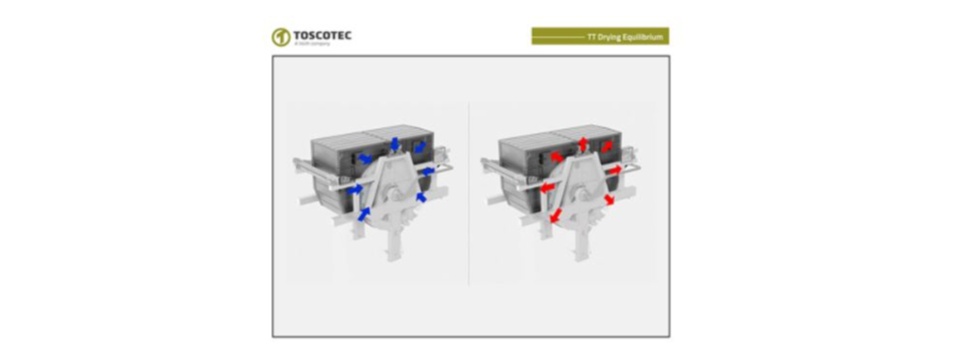Toscotec steps up Yankee hood efficiency with TT Drying Equilibrium
News General news
Toscotec boosts the drying efficiency of its tissue lines with TT Drying Equilibrium, a simple and reliable system that ensures an optimal and automatic regulation of the air balance in the Yankee hoods and air system. The system was originally designed by Voith and transferred to Toscotec for further development in the synergy-creating cooperation established with the acquisition. TT Drying Equilibrium measures several attributes of the air going in and out of the hoods, and automatically adjusts the system to guarantee the highest productivity and energy efficiency.

Stefano Pecchia, Energy Technology Director at Toscotec, says: “In a properly balanced hood system, the masses of gases - vapour and dry air - that are fed into the system are equal to those that go out through the chimney as exhaust air. This balance is crucial to avoid fresh air getting in and hot air going out during manufacturing; in this way, you can achieve maximum drying efficiency. We recommend the automatic balancing system especially on tissue machines that frequently change basis weight during the production cycle. It would be more complicated for operators to balance the system manually at every change; TT Drying Equilibrium makes these adjustments automatically, in a much faster and more effective way.”
The control and regulation logics are managed by a dedicated PLC (Programmable Logic Controller) that communicates with the DCS (Distributed Control System) of the tissue machine. The mill can easily access the data collected, stored and organized by the PLC on local monitors, tablets, or smartphones, through a remote connection.
Ensure product quality
A lack of balance in the hoods can be triggered both by over-pressure that causes hot air to go out, and by under-pressure that causes cold air to be pulled into system through the gap between the Yankee and the hoods. These imbalances will reduce energy efficiency, give rise to paper quality issues, cause environment-related issues, and potentially be unsafe to personnel. In fact, in the event of air suction, cold air on the paper can lead to its detachment from the Yankee surface and to an uneven moisture profile. In case of over-pressure, hot air can cause overheating of the surrounding area with increased fire risks, discomfort or danger for operators, possible damage to adjacent equipment, and deterioration of the environmental conditions of the machine hall. By ensuring hood balance, TT Drying Equilibrium contributes to effectively avoid these issues and deliver the best possible product quality.
An effective twofold Balance Control
TT Drying Equilibrium consists of a set of various transmitters of physical data, including speed, flow rate, temperature, humidity, and pressure, and of a data acquisition and processing system.
The calculation algorithms produce the mass flow rates inside all the air ducts leading into and out of the Yankee hoods, including outgoing air, make-up air, and combustive air both on wet-end and dry-end.
The combustion air is regulated by the burner control system, while the flow of exhaust air can be regulated by the moisture control loop. TT Drying Equilibrium controls the dampers that allow for make-up air to enter the system, thereby maintaining a condition of balance over time.
In addition to controlling the air mass flows, the system also checks the actual balance using temperature sensors installed just outside the Yankee-Hoods gap and of pressure transmitters inside the hoods. As a result, TT Drying Equilibrium delivers an effective twofold balance control in real time, based on the calculated balance of the masses, and on the confirmation that hot air is not escaping or cool air is not being pulled in around Yankee and Hoods.
A key tool to monitor Machine Efficiency & optimize Production and Maintenance
TT Drying Equilibrium also enables real time monitoring of the energy performance of the tissue machine. It processes production data acquired from the DCS and produces precise figures or trends relating to the tissue machine’s energy consumptions, including steam, gas, and electrical power consumption.
It also acquires key data of the air system’s heat recovery units, including inlet and outlet temperatures and flow rates, to monitor their performance, and plan maintenance activities. This allows the mill to check production efficiency by product over time, and to perform preventive maintenance.










